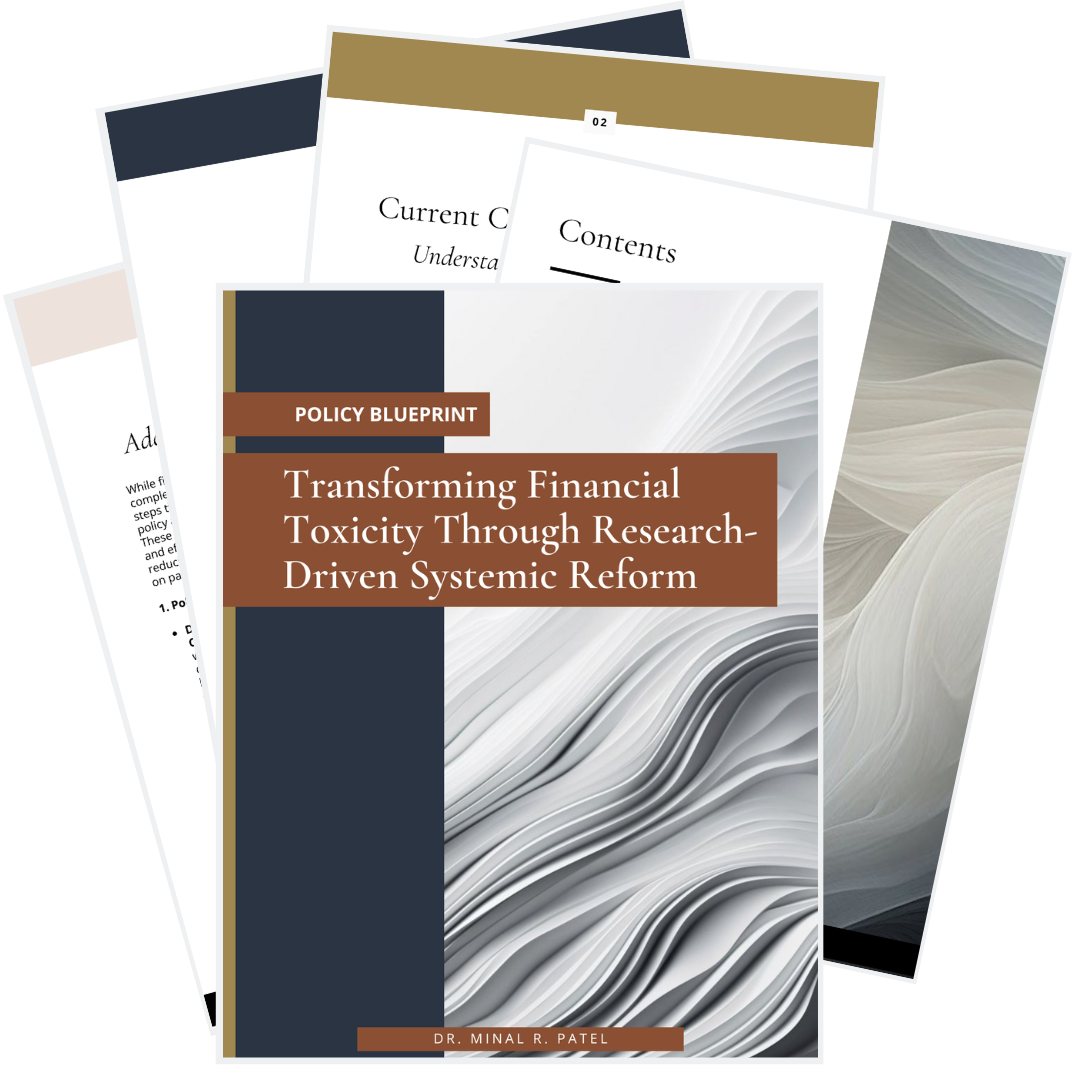Expertise & Projects
100+
Scientific Articles
Written and published
$15+
MILLION IN FUNDING
Awarded in external research funding
100 +
Collaborators
With policymakers and healthcare
Bridging Research and Real-World Solutions
Explore Published Research Articles and Commentaries
My work centers on how cost, system design, and unmet daily needs affect people living with chronic illness- and what can be done to reduce those barriers. I lead research that is meant to be used, not just cited: tools that help patients navigate care, policies that improve affordability, and programs that work across settings.
Below, are key areas where I contribute research, insight, an strategy.
Innovative Research

Measurement and Validation of the Comprehensive Score for Financial Toxicity (COST) in a Population With Diabetes
The Comprehensive Score for Financial Toxicity-Functional Assessment of Chronic Illness Therapy (COST-FACIT) is a validated instrument measuring financial distress among people with cancer. The reliability and construct validity of the 11-item COST-FACIT were examined in adults with diabetes and high A1C.
READ MORE

Social Determinants of Health, Cost-related Nonadherence, and Cost-reducing Behaviors Among Adults With Diabetes: Findings From the National Health Interview Survey
Cost-related nonadherence (CRN) is prevalent among individuals with diabetes and can have significant negative health consequences. We examined health-related and non-health-related pressures and the use of cost-reducing strategies among the US adult population with and without diabetes that may impact CRN.
READ MORE

Chronic Disease and Future Perceptions of Financial Control: Results From the Midlife in the United States Cohort Study
Rising health care costs and chronic disease prevalence have increased concerns about health-related financial burden. This study examined how baseline chronic disease burden was associated with subsequent perceptions of financial control ∼9 years later.
READ MORE
Practical Solutions

A Randomized Controlled Trial to Improve Unmet Social Needs and Clinical Outcomes Among Adults with Diabetes
Adults with type 1 or type 2 diabetes often face financial challenges and other unmet social needs to effective diabetes self-management. Whether a digital intervention focused on addressing socioeconomic determinants of health improves diabetes clinical outcomes more than usual care.
READ MORE

Clinically Meaningful Classes of Financial Toxicity for Patients with Diabetes
This study aims to improve the interpretability and clinical utility of the COmprehensive Score for financial Toxicity-Functional Assessment of Chronic Illness Therapy (COST-FACIT) by identifying distinct financial toxicity classes in adults with diabetes.
READ MORE

Solutions to Address Diabetes-Related Financial Burden and Cost-Related Nonadherence: Results From a Pilot Study
Cost-related nonadherence (CRN) to recommended self-management behaviors among adults with chronic conditions such as diabetes is prevalent. Few behavioral interventions to mitigate CRN have been tested and evaluated.
READ MORE
Accessible Care

Examination of Changes in Health Status Among Michigan Medicaid Expansion Enrollees From 2016 to 2017
Evidence about the health benefits of Medicaid expansion has been mixed and has largely come from comparing expansion and nonexpansion states.
To examine the self-reported health of enrollees in Michigan’s Medicaid expansion, the Healthy Michigan Plan (HMP), over time.
READ MORE

Improving the Affordability of Prescription Medications for People with Chronic Respiratory Disease. An Official American Thoracic Society Policy Statement
Mounting evidence indicates that out-of-pocket costs for prescription medications, particularly among low- and middle-income patients with chronic diseases, are imposing financial burden, reducing medication adherence, and worsening health outcomes. This problem is exacerbated by a paucity of generic alternatives for prevalent lung diseases, such as asthma and chronic obstructive pulmonary disease, as well as high-cost medicines for rare diseases, such as cystic fibrosis.
READ MORE

Motivators, Barriers, and Preferences to Engagement With Offered Social Care Assistance Among People With Diabetes: A Mixed Methods Study
A substantial proportion of patients screening positive for social risks either decline assistance or do not follow-up with offered resources. This study examined patient interest in and engagement with offered social care assistance among adults with poorly controlled diabetes at an academic medical center.
READ MORE
Collaborative Projects

Expanding Research On The Impact Of Financial Hardship On Emotional Well-Being
The Emotional Well-Being and Economic Burden (EMOT-ECON) Research Network is one of six research networks funded by the National Institutes of Health (NIH) to advance research about emotional well-being (EWB), and the only one that focuses on addressing how economic burden due to disease or illness affects EWB.
READ MORE

Food Insecurity Prevalence and Risk Factors at a Large Academic Medical Center in Michigan
Health care systems are increasingly adopting methods to screen for and integrate food insecurity and other social risk factors into electronic health records. However, there remain knowledge gaps regarding the cumulative burden of food insecurity in large clinical settings, which patients are most at risk, and the extent to which patients are interested in social assistance through their health care system.
READ MORE

Insuring Good Health: Outcomes and Acceptability of a Participatory Health Insurance Literacy Intervention in Diverse Urban Communities
The purpose of this study was to evaluate the effectiveness of the Insuring Good Health Intervention, a website and video series designed to improve engagement with health insurance and ACA reforms. The study was designed and implemented using a community-based participatory research approach.
READ MORE
free guide
What steps can be taken to create systemic solutions for financial barriers in healthcare?
Learn how systemic change, backed by research, can create a more equitable healthcare system. This guide offers policy-level insights and strategies to help stakeholders collaborate for lasting improvements in healthcare affordability.

